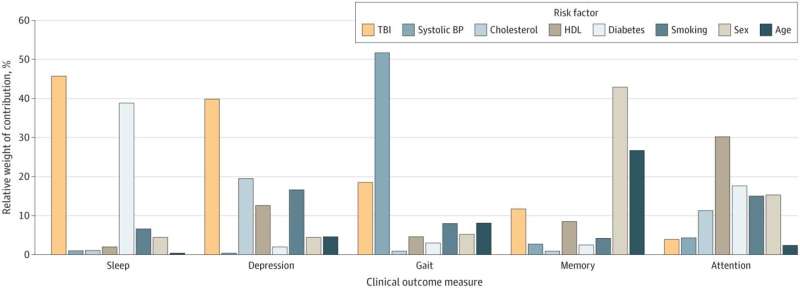August 23, 2024 report
This article has been reviewed according to Science X's editorial process and policies. Editors have highlighted the following attributes while ensuring the content's credibility:
fact-checked
peer-reviewed publication
trusted source
proofread
Study suggests even mild concussions can have lifelong brain impacts

A team of neuroscientists, brain specialists and psychiatrists, led by a group at Cambridge University, in the U.K, has found evidence suggesting that minor brain injuries that occur early in life, may have health impacts later on.
In their paper published in the journal JAMA Network Open, the group describes how they analyzed and compared MRI scans from hundreds of people participating in the U.K.'s Prevent Dementia study.
Prior research has suggested that some forms of dementia could be related to some types of brain injuries. In this new effort, the research team, hoping to learn more about the impact of concussions or other minor brain injuries on dementia, looked at MRI scans of 617 people between the ages of 40 to 59 who had volunteered to take part in the Prevent Dementia study and who had undergone at least three MRI scans. They also studied their medical histories, focusing most specifically on whether they had had brain injuries anytime during their life.
The research team noted that 36.1% of the volunteers reported having experienced at least one brain injury that was serious enough to have caused them to be unconscious for a short period of time—such injuries are classified as traumatic brain injuries (TBIs).
Looking at the MRI scans, the researchers found higher than normal instances of cerebral microbleeds (1 in 6 of them) and other symptoms of what they describe as evidence of small vessel disease of the brain. They also found that those patients with at least one TBI were more likely to smoke cigarettes, had more sleep problems, were more likely to have gait issues and to suffer from depression. They also noted that the more TBIs a person had, the more such problems became apparent.
Another thing that stood out, the team notes, was that those people who had experienced a TBI when younger had a higher risk of memory problems than did patients with cardiovascular disease, high blood pressure or diabetes, a possible clue about their likelihood of developing dementia.
The researchers conclude by suggesting that more work needs to be done to learn about the long-term impacts of TBIs, particularly regarding memory retention problems and possible associations with the development of dementia. They further suggest that their work hints at the possibility of unknown health consequences years after people suffer head injuries.
More information: Audrey Low et al, Neuroimaging and Clinical Findings in Healthy Middle-Aged Adults With Mild Traumatic Brain Injury in the PREVENT Dementia Study, JAMA Network Open (2024). DOI: 10.1001/jamanetworkopen.2024.26774
© 2024 Science X Network


















